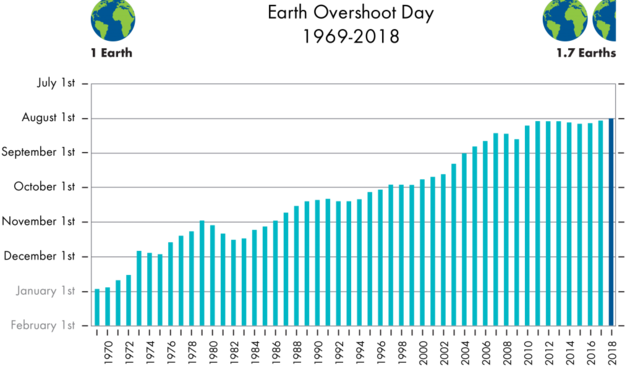There have been a number of articles this week about Earth Overshoot Day - it was the earliest it has ever been this year; August 1st. There are tow chinks of light however. The first can be seen in the shape of this graph:
GLOBAL FOOTPRINT NETWORK NATIONAL FOOTPRINT ACCOUNTS 2018
Overshoot day seems to be arriving at almost the same day every year now. Since 2011 it has been on, or around, July 31st. Hopefully we won't be stuck on this plateau for another seven years, it is not impossible for this graph to become a bell shaped one. Hopefully we'll start to descend quite rapidly.
We can do this, we can #MoveTheDate if we think systemically and identify the leverage points that can be tugged at to trigger the systemic change that will get us out of this mess.
What seems to be missing from the conversation around Overshoot day is just how much inequality there is in resource use. We do get graphs like this:
GLOBAL FOOTPRINT NETWORK NATIONAL FOOTPRINT ACCOUNTS 2018
These are useful, to an extent, but they give a bit of a warped picture of who's to blame. Inequality of wealth and resource use exists between countries as the graph shows, but also within them, as it doesn't. We need to drill down and look at what is going on in each country.
The ecological footprints of US citizens, for example, are going to vary drastically. For many the footprint will be quite low, maybe 1.5 planets, whereas for a small minority the footprint will be gigantic - 10 planets or more. It is this small minority who are accelerating natural resources use, it is their behaviour that we need to leverage.
This is the other chink of light, we don't need to change the consumption habits of the entirety of humanity. We actually only need to change the consumption habits of a comparatively small percentage of the population in each country.
Overshoot day can be shifted if we tackle economic inequality more effectively. Make inequality a central part of the conversation next Overshoot day.


